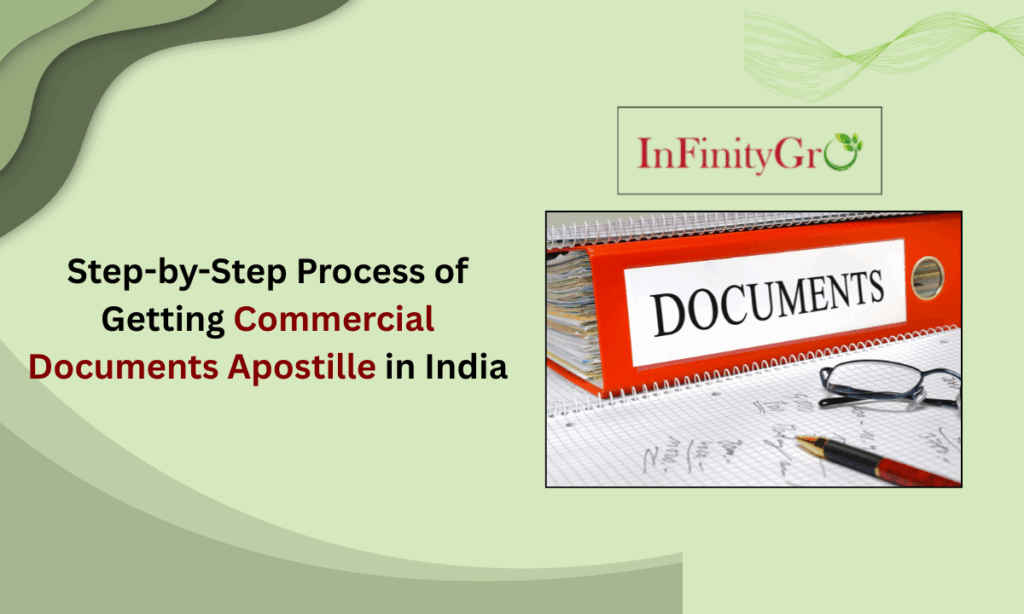If you’re into business and planning to go international, one thing you can’t escape is paperwork. And let’s be honest, paperwork feels like a never-ending headache, right? But here’s the good news-getting Commercial Documents Apostille in India is not rocket science. In fact, once you know the steps, it’s just like ticking boxes on a checklist.
What exactly is Commercial Documents Apostille?
Before jumping into the process, let’s understand the word itself. Apostille is nothing but a fancy term for “internationally accepted stamp.” The VIP pass is synonymous with allowing the foreign authorities not to question the authenticity of your documents.
While we say Commercial Documents Apostille, it would mean:
- Power of Attorney
- Certificate of Incorporation
- Board Resolutions
- MoA & AoA
- Export/Import Papers
- Invoices, Agreements, etc.
In simple words, it’s giving your business documents a passport to travel abroad.
Step-Wise Procedure for Commercial Documents Apostille in India
Let us not complicate the issue. Here is how it goes:
Step 1: Notarization of Documents
First stop-Notary Office. A notary checks your papers and stamps them. Without this, nothing moves ahead. Think of it as the gate pass.
Step 2: Chamber of Commerce Stamp
Since we’re talking business documents, the Chamber of Commerce also needs to approve them. Their stamp says, “Yep, these are official commercial papers.”
Step 3: Relevant Authority Verification
Some documents also need attestation from a state department or any other specific authority. Depending on your type of document-the big but-don’t panic.
Step 4: MEA Apostille
This is the grand finale. The MEA puts an apostille sticker on your documents, and boom-they’re now valid in all Hague Convention countries.
That’s it! Looks big on paper, but in real, it’s just a sequence of stamps.
Why Bother With Commercial Documents Apostille?
Good question. Here’s the deal: if your documents are not apostilled, foreign authorities won’t even look at them. Suppose you’re opening a branch in Europe or signing a trade deal in Dubai, they’ll ask for apostilled papers. Without it, your deal might get stuck.
So yeah, no apostille = no business. Jokes apart, it’s that important.
How Much Time and Money Does It Take?
- Time: Normally 3–7 working days.
- Cost: Depends on the type of document and the service provider. Honestly, it’s not that expensive compared to embassy attestation.
Pro tip: If you don’t like running around offices, just use an agency. Saves time, saves stress.
Mistakes People Usually Make
- Forgetting to notarize documents (this is like skipping step one in a recipe).
- Submitting incomplete papers.
- Using old or expired documents.
- Not double-checking stamps and signatures.
If you can, go ahead and be careful and you will sail through.
For official guidelines and updates, visit the Government of India Apostille Services page
Final Words
So that’s the step-by-step process of getting Commercial Documents Apostille in India. Honestly, it’s not as scary as people make it sound. Once you follow the steps—Notary → Chamber of Commerce → State/Authority → MEA—you’re done.
In fact, it’s more like a passport for your business documents, letting them cross borders without questions. If you’re planning to expand globally, keep apostille on your checklist right at the top.
FAQs on Commercial Documents Apostille
Q1. How long does the process take?
Around 3–7 days. Agencies may do it even quicker.
Q2. Do all countries accept an apostille?
Nope, only Hague Convention countries. Others need embassy attestation.
Q3. Is notarization compulsory?
Yes, 100%. Without it, you can’t move ahead.
Q4. Can I do apostille by myself?
Technically yes, but it’s time-consuming. Agencies make life easier.
Q5. What if I don’t apostille my documents?
Foreign authorities won’t accept them, and your deal may get stuck.
